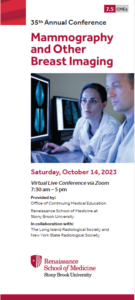Objectives
- Describe the pathology of ILC as it relates to imaging.
- List ways that ILC differs from IDC regarding imaging, surgical outcomes and metastatic pattern.
- Provide the differential diagnosis of architectural distortion and how the entities may be distinguished.
- Identify worrisome features of masses on mammography and ultrasound.
- Accurately assess interval change in breast masses.
- Reliably distinguish cystic and solid features of masses.
- Describe the radiology-pathology correlation of DCIS on mammography and ultrasound.
- Understand the differing appearances of low vs. high grade DCIS on mammography.
- Describe the non-calcified appearances of DCIS on mammography and US.
- Understand adaptive vs. maladaptive responses to bad news.
- Describe several ways to manage patients with maladaptive responses.
- Pros and cons of newly available breast cancer biopsy devices.
- Establish a coherent follow-up imaging protocol for breast biopsies.
- Properly choose a percutaneous biopsy clip.
- Differentiate suspicious non-mas enhancement (NME) from non-suspicious finding.
- Describe the use of kinetics in the management of NME.
- Describe mass findings on DCIS on MRI.
- Describe the equipment and technique of contrast-enhanced mammography (CEM).
- Distinguish suspicious CEM findings compared with background parenchymal enhancement.
- Discuss the finances and barriers to patient acceptance of CEM.
- Compare international breast cancer incidence rates and screening strategies.
- Compare international treatment regimes and survival rates.
- Recognize race-based disparities for screening and survival in the United States.
- Recount the ongoing genetic breakthroughs in oncogene screening.
- Explain the mechanism behind phenotypic manifestations of oncogene expression.
- Review the targeted gene therapies now available and under review.
- Identify and correct common breast MRI artifacts.
- Describe characteristics of masses on MRI that drive management.
- Describe management of findings on staging MRI and neoadjuvant therapy.
- Implement clinically relevant decision-making in difficult cases, as presented in an interactive, real-time audience participation session.
- Appropriately use the ACR Lexicon with difficult breast imaging cases.
Guest Speakers
Paul Fisher, MD
– A Global View of Breast Cancer
– Breast Masses
– Challenging Cases
– Genetics of Breast Cancer
– Percutaneous Breast Biopsy: State-of-the-Art
Dr. Paul Fisher, currently Distinguished Medical Educator at the Renaissance School of Medicine at Stony Brook University, is a retired Associate Professor of Radiology and Surgery, who graduated from Georgetown University School of Medicine, attended his radiology residency at Harvard Medical School,
Mt. Auburn Hospital, then went on to do his Fellowship at Yale-New Haven Hospital and Yale Medical School. Appointed at Stony Brook University Hospital in 1999, he specializes in Breast Imaging.
Dr. Fisher is the former Acting Chairman of the Department of Radiology at Women’s Hospital in Philadelphia, and was the Chief of Breast Imaging at Yale, Medical College of Pennsylvania, and Stony Brook University Hospital. He had been a long-standing member of the Board of Directors of Physicians for Social Responsibility, which won the Nobel Peace Prize in 1985. He has won the Teacher of the Year Award seven times in the past 16 years, as well as the prestigious Aesclepius Teaching Award of the Renaissance School of Medicine at Stony Brook University (the only radiologist to have won this prize to date). He has won many other awards, including the Broad Street Pump Award from the Physicians for Social Responsibility, The Michael Maffetone Outstanding Clinician Award, and the Ward Melville Heritage Partner Award. He is the former Chairman of the Alumni Schools Committee of Princeton University (his undergraduate alma mater), and thus was responsible for directing hundreds of interviews of Princeton University applicants.
Dr. Fisher recently completed a term on the RSNA Scientific Review Committee, and as a question writer for the American College of Radiology’s CPI. He currently serves on the Board of Directors of the Suffolk County Medical Society. He is the former President of the Long Island Radiologic Society, and serves on its Board of Directors.
Jennifer Harvey, MD
– Contrast-Enhanced Mammography
– DCIS – Mammography and Ultrasound
– DCIS – MRI
– Invasive Lobular Carcinoma
– MRI Cases
– Talking with Patients – Even the Angry Ones
Dr. Jennifer A. Harvey is a professor of Imaging Sciences at the University of Rochester School of Medicine and Dentistry, where she also serves as the department’s chair. Previously, she served as professor of radiology at the University of Virginia Health System, where she led the division of Breast Imaging and the Breast Care Program, and was vice chair for education and faculty development.
Dr. Harvey received her undergraduate degree from Northern Arizona University, later completing both her medical degree and residency in diagnostic radiology at the University of Arizona. Today, her research interest explores the association of mammographic density and breast cancer risk, as well as predication of breast cancer risk through modeling. Her collaborative work resulted in the most recent and most commonly used breast cancer risk model, the Tyrer-Cuzick model, v8. Over the course of the last three decades, she has authored more than 90 peer reviewed publications and has given national and international invited lectures at more than 120 meetings. Her book, Making the Diagnosis: A Practical Approach to Breast Imaging, has sold more than 1,500 copies and has been translated into four different languages. Dr. Harvey currently serves as the breast section head at the ACR Institute for Radiologic Pathology. She has been honored with many national awards, including the Lifetime Service Award from the American Board of Radiology. She is the founding editor-in-chief of the Journal of Breast Imaging.


